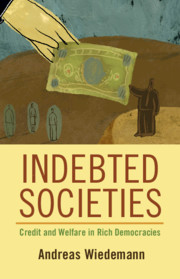Book contents
- Frontmatter
- Contents
- List of Figures
- List of Tables
- Acknowledgments
- 1 Credit and Welfare in Rich Democracies
- 2 A Social Policy Theory of Everyday Borrowing
- 3 Financial Shortfalls and the Role of Welfare States
- 4 Credit Regimes and Patterns of Household Indebtedness
- 5 Borrowing to Address Labor Market Risks
- 6 Borrowing during the Life Course
- 7 The Political and Socioeconomic Consequences of Credit and Debt
- 8 Implications and Conclusion
- Appendix
- Bibliography
- Index
- Series page
1 - Credit and Welfare in Rich Democracies
Published online by Cambridge University Press: 18 June 2021
- Frontmatter
- Contents
- List of Figures
- List of Tables
- Acknowledgments
- 1 Credit and Welfare in Rich Democracies
- 2 A Social Policy Theory of Everyday Borrowing
- 3 Financial Shortfalls and the Role of Welfare States
- 4 Credit Regimes and Patterns of Household Indebtedness
- 5 Borrowing to Address Labor Market Risks
- 6 Borrowing during the Life Course
- 7 The Political and Socioeconomic Consequences of Credit and Debt
- 8 Implications and Conclusion
- Appendix
- Bibliography
- Index
- Series page
Summary
This introductory chapter identifies key puzzles and questions, lays out the book’s main argument, and highlights the book’s contributions and implications. The book develops a new comparative framework that integrates credit regimes and social policies in the study of comparative political economy. It contributes to a range of literatures in political science and sociology, including the literatures on states and markets by moving beyond the focus on a purely substitutive link between welfare states and financial markets; it expands work in international political economy on capital flows and policy scope by introducing the notion of credit regimes; and it sheds new light on research on income and wealth inequality by documenting credit markets’ regressive allocation and distribution of resources and responsibilities and new forms of inequality and discrimination. The chapter then lays out the book’s main empirical strategies and data sources. The book’s key approach is to studying individuals within particular institutional constraints in different countries cope with social risks and seize social opportunities. It does so by drawing on a new measure of credit regime permissiveness, longitudinal micro-level panel data from Denmark, the United States, and Germany, and an original cross-national survey.
Keywords
- Type
- Chapter
- Information
- Indebted SocietiesCredit and Welfare in Rich Democracies, pp. 1 - 25Publisher: Cambridge University PressPrint publication year: 2021



